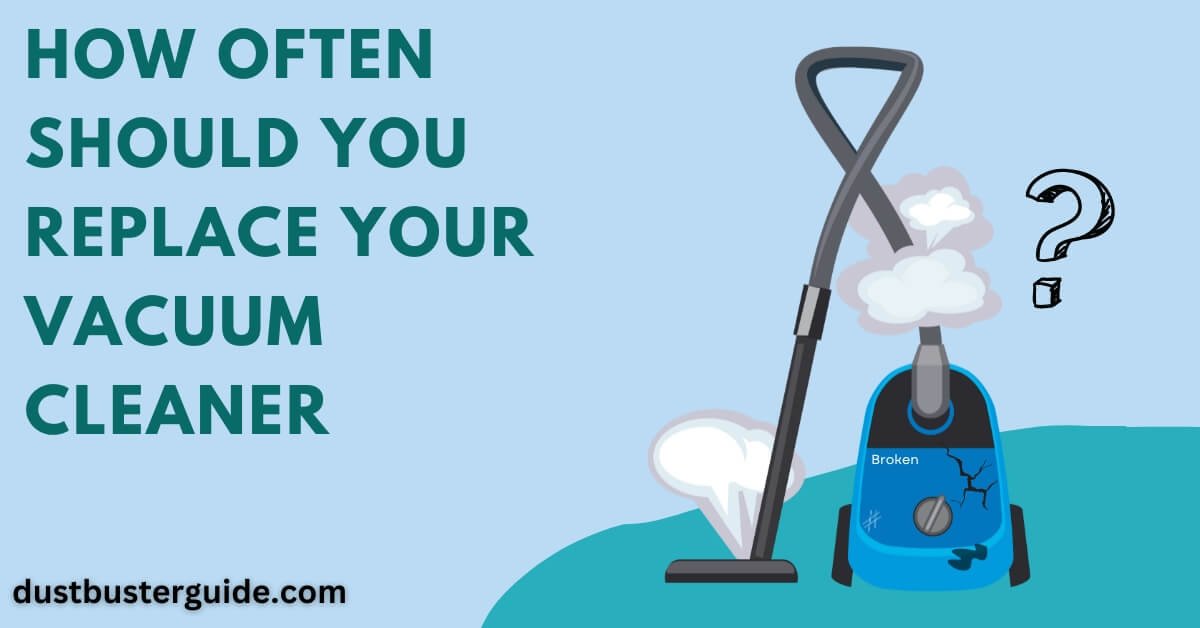Ever wondered when it’s time to bid farewell to your trusty vacuum cleaner and welcome a new cleaning companion? Today, we’re tackling the question: how often should you replace your vacuum cleaner? Picture this: your vacuum as a loyal sidekick in the battle against dust and dirt. But, like any hero, it has its limits.
Before you find yourself in a cleaning conundrum, here’s the straight scoop – it’s generally recommended to replace your vacuum cleaner every 8 to 10 years. Join us on this journey as we explore the signs that your vacuum is hinting at retirement and the benefits of upgrading.
Get ready to navigate the world of vacuum longevity, ensuring that your cleaning superhero remains at the peak of its performance!
How Long Does A Typical Vacuum Last?
Typically, you should anticipate your vacuum to last about eight years. However, factors like brand and regular usage might substantially reduce that amount to five or even three years. Another issue that can suddenly cause your vacuum to cease working is if you have utilized it for tasks it was not supposed to handle. For example, if you use a low-cost vacuum to clean up animal fur, it will likely fail sooner and perform poorly.
What Are The Signs You Need To Replace Your Vacuum Cleaner – (7 Signs)
So, now that you have an idea of the average lifespan of a standard vacuum cleaner, let’s move on. Below are some warning signs to help you determine: how often should you replace your vacuum cleaner? So, the next time you start cleaning, look closely to see if your vacuum has any of these. So without further pushing it, let’s now find out what are the signs you need to replace your vacuum cleaner:
- It’s more than four years old.
- It’s not as powerful.
- There’s a burning smell.
- It makes weird noises.
- It exhausts dust instead of clean air.
- Your needs have changed.
- Maintenance is too complicated and costly.
It’s More Than Four Years Old
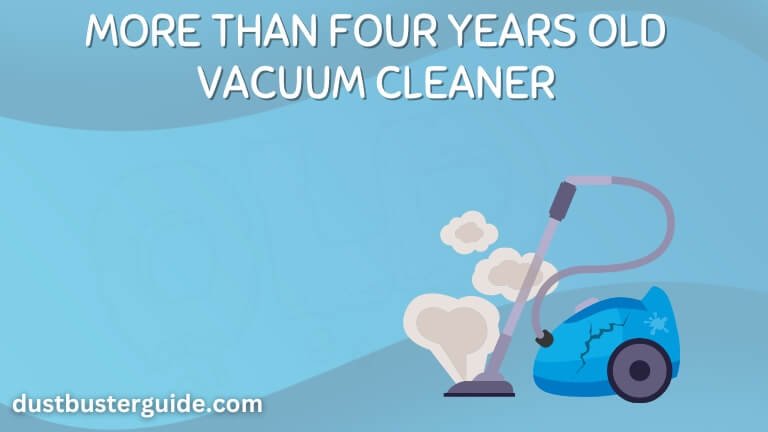
The first approach to determining is to find out how long it is to your vacuum cleaner. A mid-range vacuum cleaner has a six-year average life expectancy. So if it’s more than four years, know that your vacuum is counting its last days.
Blocked filters, jammed brush rolls, frayed hoses, and broken accessories can all be repaired or replaced by yourself. However, if you have a significant problem, such as a broken switch or a burned-out motor, you’ll need to pay for repairs or a new vacuum cleaner.
Repairs and replacement parts can cost as much as a new vacuum after four years, especially for less expensive versions. However, repairs may be profitable for a more expensive model, so it’s worth investing.
It’s Not As Powerful
While sitting in your launch, are you pondering the question, how often should I replace my vacuum? Then you should pay attention to your vacuum cleaner’s suction power since it might assist you in finding the answer to your question.
Suction loss is the most prevalent and obvious symptom that your vacuum has lost its power to work. If you have to run the vacuum over the exact location several times, there is a problem. Still, your vacuum may have always been like this, so consider whether it was powerful enough when it was spanking new.
Furthermore, this is frequently repairable because clogged or dirty filters may cause it. Check all hoses, poles, and attachments for blocking and clean the filters according to the user handbook.
Suction loss can occur for various reasons, some of which may or may not be repairable. If you have a skilled handyman or the item is under warranty, try to uncover the cause and a remedy. However, if it is several years old and no longer as powerful as it once was, you must replace it because it has weakened over years of continuous use.
There’s A Burning Smell
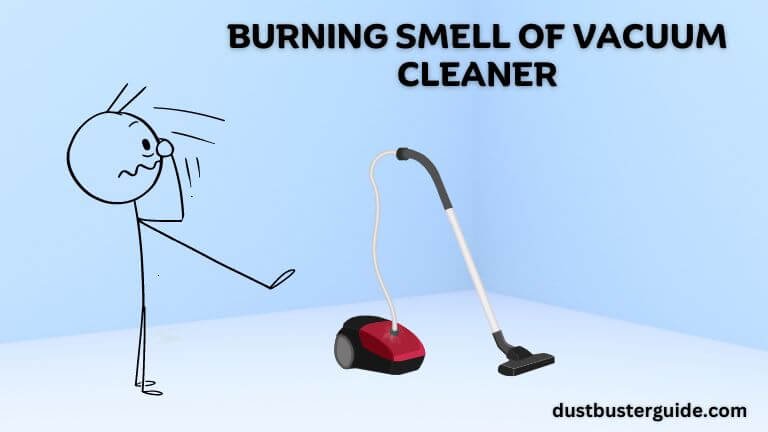
Any unusual odor, especially one burning, is cause for alarm. It does not necessarily have to be worrisome, but you should always check. If your vacuum smells like burned plastic and frequently shuts down, consider replacing it. A jammed rotor or wheels can cause it, so constantly inspect it.
Sometimes only hairs get caught and prevent certain sections from turning. You can repair this by trimming and untangling the hair. If the stench persists, you should replace the complete unit before it catches fire. It would be best if you did not disregard this or any other indicators of overheating since it could catch fire or explode, which would be highly dangerous.
It Makes Weird Noises
All vacuums are loud, but if you’ve had yours for a while, you’re usually used to it and it makes any difference in the noise it generates easier to detect. Please accept this alteration because it could be your vac’s final scream for help. A high-pitched or squeaking noise indicates that the motor is dying, and you should replace it as soon as possible.
If you have a decent handyman or the machine is still under warranty, it may be possible to repair the motor. However, if you’ve used the same vacuum for years, it’s your sign that you should replace your entire vacuum cleaner with a new one.
It Gets Clogged Easily
If your vacuum easily gets clogged very often, it is a strong indication that you should consider replacing your vacuum cleaner. Vacuum cleaners that frequently suffer from clogs may signal underlying issues, such as an inefficient filtration system or reduced suction power. This not only hinders cleaning performance but also leads to frustration during your cleaning routine.
While regular maintenance can help to some extent, persistent clogging problems suggest that it’s time to explore newer vacuum models. Upgrading to a more modern vacuum typically offers improved filtration and enhanced suction capabilities, effectively addressing clogging issues and providing a smoother and more efficient cleaning experience.
It Exhausts Dust Instead Of Clean Air
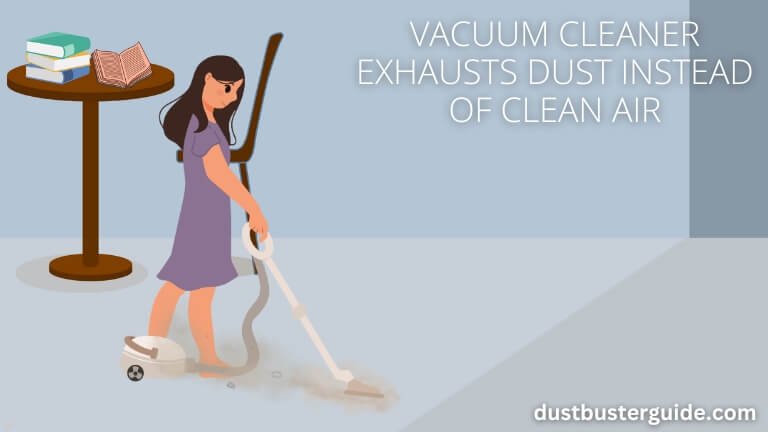
If your vacuum produces dust instead of clean air, this is another red flag that it’s time to replace your vacuum. This problem may be due to dirty filters or clogging. Therefore you should try to address it first. Before operating the machine again, wash or replace the filters as directed in the user manual. If that doesn’t work, it’s time to get a new vacuum.
Your Needs Have Changed
If your current vacuum cleaner cannot perform a particular job, it may be time to replace it.
Some vacuums are more versatile than others, but it is uncommon for a vacuum to clean all surfaces. As a result, your old vacuum may not be suitable for your new floors. Perhaps its wheels have become rough and damaged over time and are now hurting your bare floorboards.
Whatever the reason, you’ll notice it right away as the cleaning process gets more difficult and time-consuming. Your vacuum may need to be more powerful to remove dust from thick carpets. Moreover, If you recently acquired a pet that rips balls of hair, you should invest in a more appropriate vacuum.
If you moved into a small apartment, your old and heavy unit might require more work to operate in small spaces. Even if it’s reasonably recent and generally working great, you’ll have to replace it in this situation.
If your need for a vacuum cleaner changes from time to time, it’s another clear answer to how often you should replace it.
Maintenance Is Too Complicated And Costly
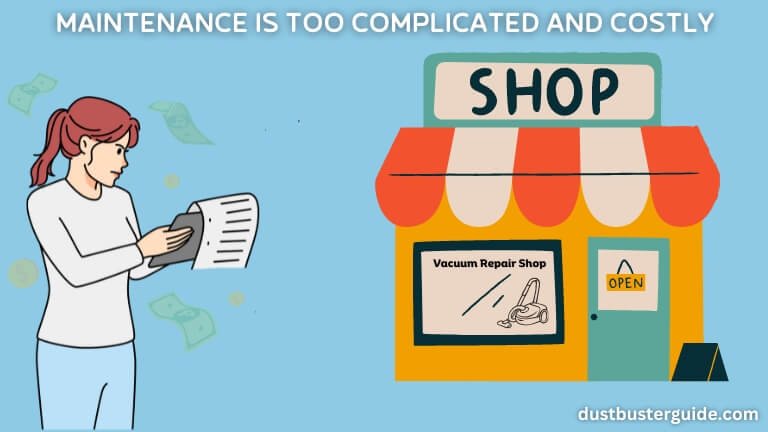
As previously stated, some older models may be too difficult to repair due to their age. After 15 years of using the same vacuum cleaner, most brands discontinue models. As a result, finding spare parts or even a handyman who knows how to fix it has become challenging.
Finding filters, motors, or any replacement part for a ten-year-old vacuum is now more challenging than ever. Technology has advanced to the point where we now have new vacs every few years. Because the market is constantly expanding, even new vacs are becoming obsolete faster than ever.
As a result, maintaining your old vacuum may take a lot of work to justify. Finding, transporting, and paying someone to repair a motor on your old vacuum cleaner could cost you more than buying a new one.
Benefits Of Replacing Your Vacuum Cleaner
Let’s move toward the benefits of replacing your vacuum cleaner:
- Your new vacuum cleaner will perform better in adaption to your unique requirements.
- The filter will be both clean and adequate.
- With a newer machine, you will get improved suction.
- Your home will have additional features and a more extensive cleaning path.
- In the long term, the price isn’t that bad considering what you get for it.
- It’s simply not worth lugging your hefty machine around when simpler is often better.
Tips For Choosing Your Best Vacuum Replacement
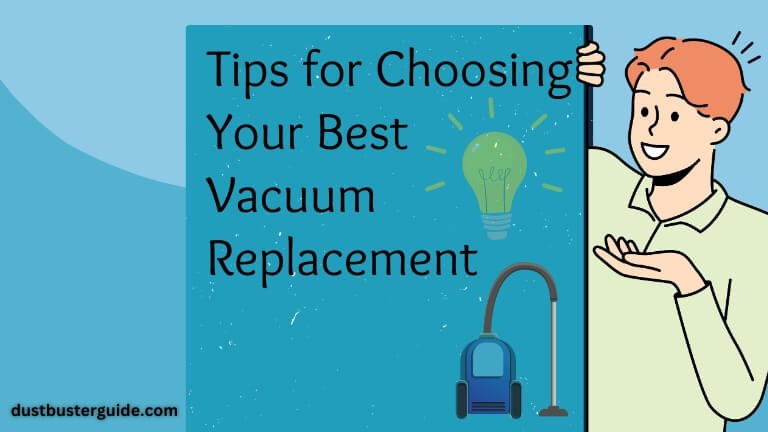
While you go shopping for a replacement for your vacuum cleaner, remember to consider these few tips:
- Look for a vacuum cleaner that best suits your needs.
- Choose a vacuum cleaner with the appropriate power rating.
- Select the proper vacuum cleaner size for your needs.
- Think about your budget and the things that are essential to you.
How Often Should You Replace Your Vacuum Cleaner’s Filters?
Vacuum cleaners are available with a variety of foam or mesh filters. Remember that clogged filters will reduce your appliance’s suction power and functionality. They will also limit airflow inside the vacuum cleaner, causing it to overheat. As a result, it can damage the parts or motor of your vacuum.
You can clean and reuse some of these filters, while others you need to replace regularly. Most manufacturers recommend changing your filter every 3-6 months. However, depending on usage and allergy care, it is recommended that you change your filter even sooner. If you have a non-washable pleated filter, you should replace it once a year.
Guidelines To Consider
Follow the guidelines below to understand when and how often you should replace your vacuum cleaner filter.
- Check the filters if your vacuum has a notable decrease in suction.
- When your filters appear dirty, but by pounding them outside, you can clean them, they are still safe to use.
- If your filters appear dirty but beating them outside does not make them cleaner, you should replace them.
- If you observe your vacuum expelling dust into the air, regardless of whether the filter appears unclean, it is time to change it.
Filters And Frequency To Clean/Replace Them

Below we have mentioned the types of vacuum cleaner filters and when to clean/replace them.
Reusable Filters
Reusable filters can be cleaned and even washed under water. These are a form of foam, and you must clean them when your vacuum shows decreasing suction strength. Allow filters to dry completely before reinstalling them. Cleaning reusable air filters every one to three months is a good rule of thumb. This duration, however, can vary based on the type and condition of the filter, as well as how frequently you use it.
Pre-Filters
Pre-filters last for 30 days. The pre-filter job is to capture massive particles that the primary filter cannot ordinarily. A pre-filter must be replaced at specific intervals since it can become damaged after being exposed to dangerous pollutants and particles such as dust, fur, pollen, and hair become trapped. It’s your choice to change or wash pre-filters, but if you want to maintain them safely, you can always replace them as needed.
Carbon Filters
Carbon filters effectively eliminate odors, smoke, and other gaseous particles. Carbon filters can last three to six months. You must Clean these filters every three months and replace them when damaged. The longevity of these filters mostly depends on the carbon quality, usage, and humidity.
HEPA Filters
HEPA filters, or high-efficiency particulate air filters, filter out particles as small as 0.3 microns and prevent them from being discharged back into the air by the exhaust of your vacuum cleaner. We recommend replacing your vacuum cleaner’s HEPA filter every six months. In some cases, it can also go for about 1.5 years.
How Can I Keep My Vacuum Working Longer?
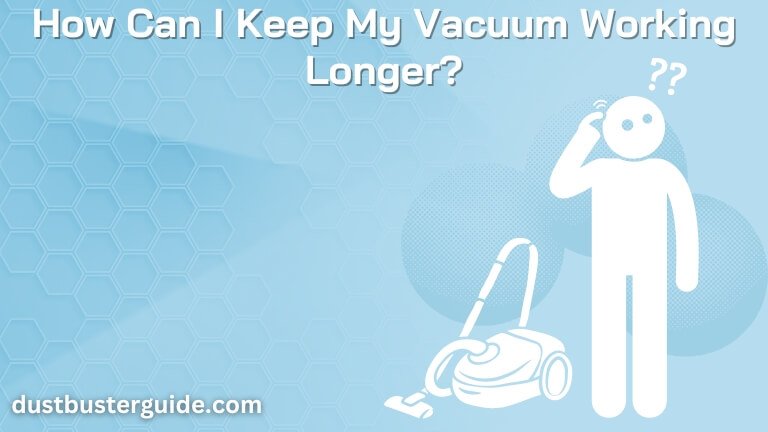
You must treat it like any other device to get the most out of your vacuum. There are several crucial factors to consider when servicing your vacuum. For example:
- It would help if you emptied the bag or bin before it was full to avoid clogging and preserve your vacuum in good working order.
- Additionally, you should clean the inside of your vacuum at least once a year, if not more. Cleaning the gear you use to clean may sound strange, but sometimes a simple scrubbing is all that is required to get your vacuum back in working order.
- Specific models may come with additional cleaning suggestions, and it’s always a good idea to examine your manual for more information. Also, always use safe cleaning methods; for example, you can use dish soap on numerous parts of your machine, but make sure to let them air dry before reinstalling—if you put them back in wet, you risk electrocution.
Conclusion
Are you exhausted with your troubleshooting options, and your vacuum is still failing? Then maybe it’s time to replace it. But before you spend hundreds of dollars on a new vacuum cleaner, consider what it would take to repair your current one. There’s a reasonable probability it’s only clogged or requires a replacement part – both of which are inexpensive fixes.
But if you are still in chaos, do not worry; this article has made you aware of all the signs that solve your query about how often should you replace your vacuum cleaner.
FAQs
What is the average life of a vacuum cleaner?
The typical lifespan of a vacuum cleaner has been estimated in recent years to be 6 to 8 years, though this varies by manufacturer.
Do vacuums lose suction over time?
Vacuum cleaners are available with a variety of foam or mesh filters. If not cleaned or replaced correctly, these may become clogged over time. As a result, your vacuum will lose suction.
What brand of vacuum lasts the longest?
Miele makes the longest-lasting vacuum. They are well-known for their longevity, with many living for up to 20 years. When compared to comparable vacuum cleaners, which have an average lifespan of eight years, you can see how dependable they are.
Is it worth fixing an old vacuum cleaner?
Regarding vacuums, there are varying degrees of quality and value; if you paid a lot for the equipment, repairs are likely worth it, but we recommend that you spend at most half the original price on any repairs.
How do I choose the best vacuum cleaner?
To choose the best vacuum cleaner, consider your specific needs and surface types, look for reliable brands, and select a model with suitable attachments and features that meet your requirements.
What are the benefits of a vacuum cleaner?
The benefits of a vacuum cleaner include efficient cleaning, improved indoor air quality by capturing allergens and dust, and the time-saving convenience it offers compared to manual cleaning methods.

